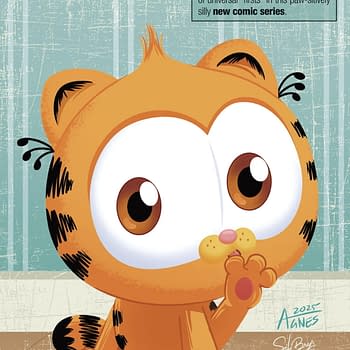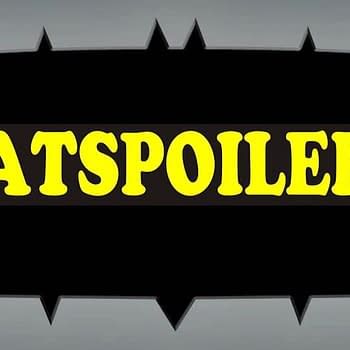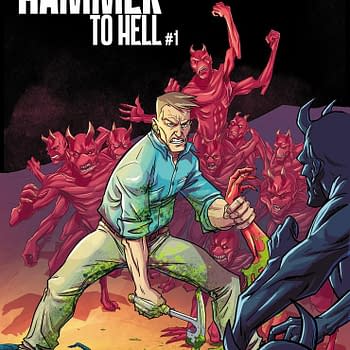Posted in: Comics, Recent Updates | Tagged: Alan Moore, avatar press, Comics, entertainment, H.P. Lovecraft, jacen burrows, providence
Alan Moore Writes A Gay, Jewish Protagonist For Providence To Address Lovecraft's Prejudices
The first issue of the new series Providence, by Alan Moore and Jacen Burrows, arrives on May 27th, and we've run an interview on the site previously, as well as an advance review of the first issue. But this week, you can also find an interview with Alan Moore in Bleeding Cool Magazine #16, on the subject of Lovecraft's legacy and the cultural context of the comic. Today we bring you a companion piece to that interview, something of a "Part 2" which explicitly addresses the character choices made by Moore and Burrows in their protagonist, Robert Black. We've also thrown in a delightfully direct rejoinder that Moore presents when pondering whether the series Providence is likely to meet with the same library-banned fate as its forerunner by Moore and Burrows, Neonomicon.

So it's with great pleasure that I present this interview with Moore on the subject of Robert Black, a character who is revealed very early on in the series to be both gay and Jewish, and why Moore felt it not only appropriate but necessary that his protagonist should navigate life as an "outsider" in the year 1919 in a world of Lovecraft's creation. Moore's choices are particularly significant because the reader will be spending quite a lot of personal time with Robert Black in the comic. Not only is he a perspective character, but he is also associated with much of the meta-material included in the series, and as Black experiences "outsider" status, so too does the reader.

Alan Moore: Robert Black. I decided that I wanted somebody who provided an example of the "new American man" around about 1919. I wanted somebody who was young, who had a sense of purpose, but who was an outsider. Somebody who was not related to the mainstream of American society, whatever that was. I chose some parts of Robert's character specifically because they resonated interestingly with some of Lovecraft's prejudices.
I thought this would be a good way to actually make some of Lovecraft's views emotionally explicit by showing them from the point of view of someone who could not help but be hurt by them. Robert is probably a little too smart for his own good. He's bookish, he's literary, he thinks he's a little bit cleverer than he is. He is planning to write a Great American Novel where he is planning to use the "Outsiders", perhaps "occult Outsiders"—whom he is on the trail of across New England—as a metaphor for social outsiders. Perhaps for his kind of social outsider. He's looking for a metaphor but what he finds is far from metaphorical (laughs). He also starts to question the notion of what a "real" outsider might be.
The idea of the outsider was, I think, fairly central in Lovecraft's fiction, and also in his image of himself. I think he saw himself as a stranger in the 20th century, as an outsider. Probably not the same kind of outsider as the decomposing ghoul in the story of that name, but probably not a million miles away from it. Now, I would question whether Lovecraft really was an outsider, any more than any of us are.

In Providence, we kind of examine the idea of the outsider. Who is the real outsider? Is it Robert Black? Is it any of the characters we meet during the course of Providence where their outsider status might perhaps be more profound? Providence gives us a chance to look at that and Robert Black seemed like an interesting character for it.
We needed to have a journalist. I considered other options, but journalist seemed like the kind of profession that might easily lead to the kind of narrative that I was imagining. And once we'd decided upon journalist, it was a matter of filling in the background. Which newspaper? These were things that Steve Moore found out for me, things about the New York Herald, its history, and its offices. The fact that they had discovered David Livingston. I found out later that they'd also been a prime mover in the case of Mary Rogers, the murdered cigar girl that Edgar Allan Poe based Marie Roget upon. The New York Herald had been a kind of scandal-mongering rag that had been behind quite a lot of that.
Having situated Robert, I worked out where he'd come from, that he'd come from Milwaukie, in Wisconsin. That for various reasons he'd felt dissatisfied or hemmed in by his upbringing and he had wanted to go to the big city. Where he could pursue, amongst other things, his career as a journalist. That must've been a fairly common story back then, at the start of the 20th century when everybody had such hopes for it, and for themselves, before Prohibition happened. When people still believed that, "No, no, no they'll never enforce Prohibition. Everybody likes a drink too much; it'll never happen".
This was before the time when the First World War concluded, and when everybody kind of worried that the Versailles Treaty would stir up trouble that would inevitably lead to a Second World War. All of these things put Robert right at the heart of things. As a reporter, reporters are sensitive to their times and the world around them. They are well informed. I could use Robert to say intelligent things about the culture that he was living in. I think that he makes quite a good Lovecraftian protagonist. He's certainly not a muscular, two-fisted Robert E. Howard type.
AM: He's much closer to Lovecraft characters, even if there are a couple of areas where it's very unlikely that he'd be the kind of character that Lovecraft would have written. By the time I'd finished writing that first episode of the series, I felt that I at least had a handle on Robert's personality. I felt that I knew him and I could navigate him through the rest of the series without too much difficulty.
HMS: Thank you. I have one more question today. Do you expect that this book, Providence, will be banned and kept out of libraries on the basis of the same kinds of criticism leveled at Neonomicon?
AM: Now, I was probably very remote and distant at the time, and didn't hear an awful lot about those criticisms, but if I understand the situation properly now, I don't think I would've been greatly distressed even if I had known more about them then. Correct me if I'm wrong, but it seems to me that this might have been the problem of people whose idea of a comic has not been modified in the last 40 years or so. These are people who, though working at libraries, are still working under the assumption that all comics are for children.

AM: Which is clearly not the case, certainly over here. I don't know about America—I haven't been to America for a long time. But over here most people kind of understand that not all comics are for children, and certainly not over the past 30 or 40 years. If I could suggest that people in libraries, or in positions like that actually—how to put this?—actually read the material that they are allocating. If they can't be bothered to do that, and if they can't be bothered to actually keep up with the current state of culture, then I'm afraid that I don't have a great deal of sympathy for them. Perhaps if they just did their job? And actually read the material?
Let me just say for the record: I think that very little of my work is suitable for children. It is not written for children. It is written for adults. Some of it is, perhaps, more innocuous than other material. I deal with H.P. Lovecraft in The League of Extraordinary Gentlemen as well as in Neonomicon and Providence, but it's two very, very different approaches to H.P. Lovecraft. One of them is the kind of playful, broader fictional mosaic of The League of Extraordinary Gentlemen, which Lovecraft's characters are made to fit into. This one, Providence, is pure Lovecraft. This one is more grown up and more intense than any treatment I have done of Lovecraft that I have done before. I would say that it is probably more extreme, in its way, than Neonomicon, which did not set out to be extreme. As with Providence, I simply set out to follow Lovecraft's ideas to what I see as their logical, dramatic conclusion. It is not my intent to shock or offend, I simply don't care that much. That probably sounds awful, but I don't write my work thinking about a reader who is likely to be offended, particularly a reader who has evidently picked up my work by a grotesque mistake.
AM: I'm mainly writing to please myself. Of course, I'm not solipsistic. I hope that I write well enough to know that when I'm pleasing myself, I will be pleasing the reader as well. But, you can never predict these things. There may be people who look at a few pages of Providence and think, "Yes, this is the perfect book to put next to The Cat in the Hat".
HMS: (Laughs) I'm trying very hard not to imagine that actually happening now…
AM: They may well think that, but I don't really think that I can be held responsible, and I don't second guess that stuff. Let me just say again: Providence is really, really horrible, and it's really disturbing, it's really frightening, and it's meant for grown-ups. Even if you do accidentally find it in some child's corner of your library, I'd advise you to take it to the main desk and ask that it be re-allocated. But that's pretty much as much as I can say about the matter.
HMS: Well, thank you. That's a very earthy and realistic answer to that question.
AM: If people are determined to misconstrue you, then I'm sure they will do so, but I can't really concern myself with them.
Providence #1 arrives on May 27th and Providence #2 arrives on June 24th in shops, and are currently listed in Previews World with item codes MAR150951 and APR151097. You can find the solicit information for issue #3 here on Bleeding Cool.
Avatar Press is the parent company to Bleeding Cool.


















